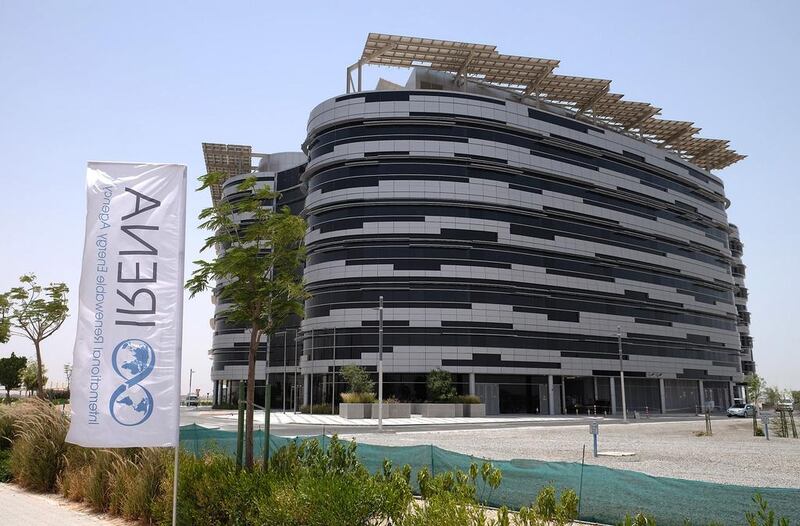The UAE’s response to the energy challenges of the future is to host an international organisation that promotes renewable energy. It’s much more than a symbolic venture for one of the world’s largest oil producers.
As always with VIP openings, there is an element of theatre to this evening’s formal inauguration of the global headquarters of the International Renewable Energy Agency – Irena.
The completion of the 32,000-square-metre complex, named “the greenest office building in the UAE”, was originally announced in January during Abu Dhabi Sustainability Week, but Irena can be forgiven for wanting its day in the sun.
The UAE beat Germany and Austria to the hosting rights for the organisation’s headquarters in June 2009, but it has taken almost six years for Irena to move into its permanent Abu Dhabi home on the edge of the Masdar City campus.
Until March, Irena’s Abu Dhabi team had operated out of temporary offices in a nondescript tower in Khalidiya.
“This is the first truly international, charter-based organisation to be hosted in the entire region and there hasn’t been the experience of hosting this kind of international organisation before,” says Irena’s director general, Adnan Amin.
“This isn’t just another not-for-profit that’s out there doing a bit of renewable energy. This is the international community’s response to how we are going to deal with the challenge of sustainable energy in the future.
“We have more than 170 countries either as members or applicants and for countries to become members it requires their parliaments to endorse the legal agreement on which the agency is built.”
Irena is one of the few charter-based international organisations of its type to have been established in recent decades. In terms of size, scope and aims it sits somewhere between bodies such as the World Trade Organisation (WTO) and Unctad, the United Nations Conference on Trade and Development.
Mr Amin, a Kenyan, admits that the process of establishing Irena has not been easy. “When the agency first came to Abu Dhabi, there was still a preparatory commission which was preparing the way,” he says. “I came in just before the first assembly, in 2011, and was expected to launch a new international organisation in just four months.
“I can’t remember if I slept very much, but as well as being one of the most intense experiences of my life it was eventually one of the most rewarding.”
Mr Amin, originally a development economist, has more than 25 years’ experience of working on UN-wide coordination, systems, and implementation initiatives and was also director of the New York office of United Nations’ environment programme (Unep) and special representative of the Unep executive director.
It’s a career that has prepared Mr Amin well for the diplomatic, bureaucratic and administrative challenges associated with establishing Irena.
“We started off with 68 members and 10 staff members and in the four years we’ve had of growing Irena we’ve created one of the most dynamic international organisations in the world,” Mr Amin says.
“While other international organisation’s budgets have been cut, ours has grown every year for the past four years and we now have a staff of almost 200 people and a suite of activities that are now reference knowledge products about renewable energy around the world.”
It’s in that last statement that Mr Amin reveals something of his many years inside the UN.
The director general’s description of Irena’s activities is full of references to policy frameworks, investment models, energy models, value-creation and capacity building, which can make its work sound a little like a dark art. But when he moves to the bigger picture, the urgency of his agency’s mission soon becomes clear.
“When it comes to energy, we’re reaching the natural limits of sustainability, which means we have to do something different, but if we continue to rely on conventional energy for generating power, then we can say goodbye to the two degree target on climate change,” he explains.
“Now we need to move very quickly towards sustainable energy because we don’t have the luxury of time, but we can do this today because the business case for renewables has become profitable.”
Even plunging oil prices, which have traditionally posed an existential threat to investment in renewables, have failed to dent the Irena chief’s confidence in the renewables sector.
Mr Amin is not alone in his assessment of the changing dynamics in the market.
Jeremy Leggett, the British founder of the global photovoltaic developer Solar Century, described the current situation in energy markets as a “moment of transition” during an FT-Irena debate that was held as part of this year’s Irena general assembly in January.
“I think the problems that are facing the energy encumbency because of this spate of low oil prices are far more severe than any problems that might be faced by renewables,” he said.
“Right across the world big projects are being cancelled because the cost of drilling or mining is too high to make the enterprise profitable and there is a rising tide of divestment. Over the past nine months, year or so, US$50 billion [Dh183bn] have been divested from fossil fuels by worried investors.”
Mr Leggett was joined on stage during the debate by Michael Liebrich, the chairman of the advisory board at Bloomberg New Energy Finance. “Ask not only what the price of oil will do to renewables,” the entrepreneur quipped. “Ask also what renewables will do to the oil price.”
This change in perception, highlighted in Messrs Leggett and Liebrich assessments, plays out in the figures and recent events. A decade ago investment in clean energy stood at $60bn but by last year it rose to $310bn, the first year in which the amount of new renewable electricity-generating capacity installed exceeded new installations of fossil fuel and nuclear generating capacity combined.
Energy companies have started to recognise the shift. In December, the German energy giant, E.ON, captured headlines with its dramatic decision to hive off its traditional power plant business and to focus on renewable energy and power grids instead.
“We have seen the emergence of a new energy world,” said Johannes Teyssen, E.ON’s chief executive, at the time of the announcement. “E.ON’s existing broad business model can no longer properly address these new challenges.”
More than events in Europe or North America, however, it is technical innovations and developments in the energy markets of the hydrocarbon dependent economies of the GCC and the Middle East that give the head of Irena cause for hope. In January, a consortium led by the Saudi renewables company Acwa Power set a new record for photovoltaic solar energy prices when it won the tender to build and operate the second phase of Mohammed bin Rashid Al Maktoum solar park in Dubai.
Acwa’s successful bid will bring tariffs down to 5.84 cents per kWh over a 25-year period, smashing the previous lowest prices by more than two cents per kWh.
Even more surprising was the statement made last month by Ali Al Naimi, the oil minister of Saudi Arabia.
“In Saudi Arabia, we recognise that eventually, one of these days, we are not going to need fossil fuels – I don’t know when, in 2040, 2050,” the minister told delegates at a business and climate conference in Paris.
“So we have embarked on a programme to develop solar energy. Hopefully, one of these days, instead of exporting fossil fuels, we will be exporting gigawatts, electric ones.”
“This region really shows how important the issue is,” says Mr Amin. “Great countries have been built on the back of oil and gas and huge achievements and contributions to human welfare have been made.
“We cannot denigrate that but at the same time what we can say that, for the future, we will have to do things differently and both Abu Dhabi and Dubai are demonstrating that they are moving in that direction.
For Adnan Amin, the UAE’s commitment to clean energy and renewables – as demonstrated by ventures such as Masdar and its role in the development of the renewable energy projects Shams 1 and the 175 wind turbine London Array, the largest offshore wind farm in the world – make it rather more than a symbolic venue for the headquarters of a new global agency dedicated to sustainable energy.
“That was something that nobody could have believed, that one of the world’s largest oil-producing countries would house an organisation that aims to replace oil in the future. This is the ultimate proof that we can change.”
nleech@thenational.ae






